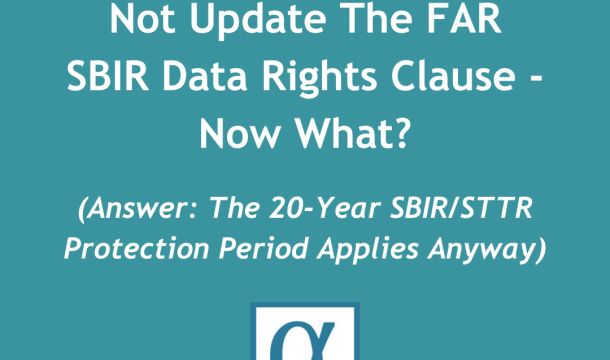The GovCon Bulletin™
Buy American Rules Update Part 1 - Final FAR Rule Raises Domestic Content Thresholds
The last several weeks have seen significant developments with regard to “Buy American" and “Made in America” rules that federal government contractors have to comply with. In particular, a Final Rule under the Federal Acquisition Regulation (FAR) published in March increased the domestic content requirements that contractor products and materials have to meet in order to qualify for preferential pricing treatment. In addition, earlier this week, the White House’s Office of Management and Budget (OMB) published guidance to federal agencies on how they should implement the Build America, Buy American Act provisions, which were part of the massive infrastructure bill - the Infrastructure Investment and Jobs Act - signed into legislation in November 2021. In this first part of our update on the Buy American rules, we will address the Final FAR rule that increases the domestic content thresholds, and in our next edition of The GovCon Bulletin,™ we will review OMB’s guidance for implementing the Build America, Buy American Act requirements in infrastructure projects.
April 22, 2022
A few weeks ago, on March 7, 2022, the U.S. Department of Defense (DoD), the General Services Administration (GSA), and the National Aeronautics and Space Administration (NASA), issued a Final Rule implementing domestic content requirements that were set forth in Executive Order 14005, Ensuring the Future Is Made In All of America by All of America’s Workers (EO 14005).
In January 2021, during the first week of the Biden administration, President Biden issued EO 14005, which ordered the Federal Acquisition Regulatory Council to issue regulations to increase domestic content requirement thresholds for end products and construction materials and to increase the price preferences for domestic end products and domestic construction materials. EO 14005 also directed the Office of Management and Budget (OMB) to establish within OMB a Made In America Office (MIAO) responsible for reviewing federal agency waivers from Made in America requirements.
As we wrote about in a prior GovCon Bulletin, DoD, GSA and NASA subsequently issued a Proposed Rule in July 2021 that increased the domestic content threshold in FAR regulations that implement the Buy American Act (BAA). The BAA encourages acquisitions of domestic products and materials by requiring agencies to implement a price preference when evaluating bids from offerors that use domestic end products and construction materials. As implemented in FAR, BAA gives large businesses that use domestic supplies a 20 percent price preference and small businesses that use domestic supplies a 30 percent price preference. For purposes of determining whether supplies are considered domestic, they must be manufactured in the U.S. and a certain percentage of their component parts must be mined, produced or manufactured in the U.S.
The Proposed Rule raised the component threshold for certain end products - namely, those that do not consist wholly or predominantly of iron or steel or a combination of both. Specifically, the content threshold increased initially from 55% to 60%, then to 65% in 2024, and then to 75% in 2029. The Proposed Rule also provided for a “fallback threshold” until one year after the increase of the domestic content to 75%. During that initial time period, a former domestic content threshold may be accepted if end products or construction materials meeting the new threshold are not available or are of unacceptable cost. The Proposed Rule left alone the current 5% domestic content threshold for end products that consists wholly or predominantly of iron or steel or a combination of both.
As for pricing preferences, although the Proposed Rule did not express higher price preferences, it offered a framework through which higher price preferences could be applied for end products and construction materials that are critical or that are made up of critical components and/or critical items, which are to be enumerated in a new FAR provision containing a list of critical items and components.
For its part, the Final Rule made a few changes to the Proposed Rule.
First, the Final Rule now becomes effective on October 25, 2022, rather than after the usual 30-day delay period for new regulations.
Also, under the Proposed Rule, a supplier awarded a contract with a period of performance that spans the schedule of domestic content threshold increases was required to comply with each increased threshold that applied in the year of delivery. However, in response to the comments received to the Proposed Rule, the Final Rule adds a process by which an agency's senior procurement executive may, after consultation with the MIAO, allow for application of an alternate domestic content test. In the event that a use of an alternate domestic content test is authorized, the contract would require compliance with the domestic content threshold in effect at time of contract award for the entire life of the contract.
In implementing the "fallback threshold," the Proposed Rule required offerors to identify which of their foreign end products and foreign construction material met the fallback threshold. The Final Rule now clarifies that this identification is only required for end products and construction material for which the fallback procedures are actually used. The Proposed Rule also did not contain any guidance on what the use of the fallback procedures would mean in relation to the procedures associated with exception to the Buy American statute for nonavailability. The Final Rule now adds language clarifying that a nonavailability determination is not required when the fallback procedures are used.
Lastly, the Proposed Rule included two new clauses that would require contractors to provide the specific domestic content of critical items, domestic end products containing a critical component, and domestic construction material containing a critical component, that were awarded under a contract. The Final Rule removes this requirement and, instead, anticipates that this requirement will be proposed in a subsequent rule establishing the list of critical items and critical components in the FAR, along with their associated enhanced price preference.



